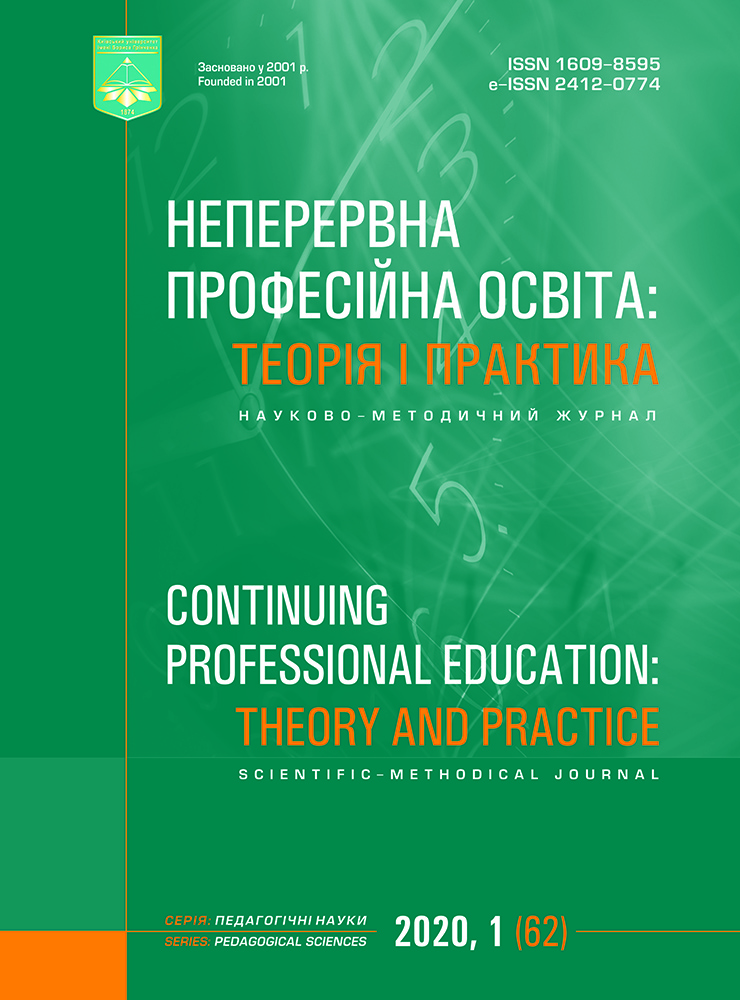CONTINUOUS EXPERTS COACHING TO INCREASE THE COMPETENCE OF PARTICIPANTS OF THE INCLUSIVE PROCESS IN EDUCATIONAL INSTITUTIONS
DOI:
https://doi.org/10.28925/1609-8595.2020.1.3Keywords:
expert coaching, inclusive education, IEP team, students with special needs, teachers’ competenceAbstract
In the article, the authors analyze ways to increase the professional competence of teachers of multidisciplinary IEP teams. This allows the conclusion that that the use of coaching is appropriate for mastering support specialists with inclusive technologies, as well as the ability to work in a team interaction mode. Despite the obvious advantages of teamwork, in Ukraine this format of work is still not mastered in an inclusive educational environment. In the article the authors present the structure of the training program based on the team management model for significant achievements (R. Hackman). We conducted a training program for 10 IEP teams, aimed at increasing the level of team interaction and inclusive competence of specialists. Formative influence was done directly during the professional activity of teachers and was accompanied by prolonged expert coaching.
In their study, the authors applied a special design scheme for teamwork. This scheme was concretized in the fact that the participants of the IEP teams used the experience gained in the training sessions in the practice of their professional activity, critically comprehended and analyzed their new experience, sought to comprehend the factors of both success and failure. Together with the coordinator and experts, all participants of the IEP teams developed rules for the team, established feedback, sought to influence the focus on mastering the modern approaches of the inclusive process at the level of the entire educational institution. In turn, this maintained the necessary level of motivation and joint intentions to introduce a competently constructed educational environment.
To assess the state of inclusive competence formation before and after the training program, we used teacher self-assessment method «Professional Development Tool for Improving the Quality of Practice in primary school». As a result, all teachers have achieved a significant increase in the effectiveness of interdisciplinary support for children with special needs, which have reflected in the positive changes that have occurred in teachers at the professional, interpersonal and personal levels.
References
Anishuk, A. M. (2013). Pidgotovka majbutnih vihovateliv do roboti z ditmi v umovah inklyuzivnoyi osviti [Preparing future caregivers to work with children in inclusive education]. Psihologo-pedagogichni nauki, 5, 213–218.
Martynchuk, O. V. (2019). Aktualizaciya problemi pidgotovki fahivciv v galuzi specialnoyi osviti do diyalnosti v inklyuzivnu osvitnomu prostori [Actualization of the problem of training of specialists in special education for activity in inclusive educational space]. Naukovij chasopis NPU imeni M. P. Dragomanova. Seriya № 19. Korekcijna pedagogika ta specialna psihologiya, 36, 74–83.
Pіters, J. (2018). Pidvishennya yakosti doshkilnoyi osviti ta doglyadu za ditmi v Ukrayini [Improving the quality of pre-school education and childcare in Ukraine]. VBJK.
Polikhronidi, A. (2016). Stvorennya inklyuzivnogo osvitnogo seredovisha v suchasnih navchalnih zakladah [Creating Inclusive Educational Environment in Modern Educational Institutions]. Nauka i osvita, 6, 82–85. https://doi. org/10.24195/2414-4665-2016-6-16.
Ratushinska, A. (2018). Neperervna samoosvita yak neobhidna umova osobistisnogo ta profesijnogo rozvitku vchiteliv pochatkovih klasiv [Continuing Self-Education as a Necessary Condition for Personal and Professional Development of Primary School Teachers]. Neperervna profesijna osvita: teoriya i praktika, 1–2, 30–37. https:// doi.org/10.28925/1609-8595.2018(1-2)3037.
Skrypnyk, T. V. (2019). Specifika realizaciyi mizhdisciplinarnogo komandnogo suprovodu v inklyuzivnomu osvitnomu seredovishi Ukrayini [Specificity of implementation interdisciplinary team support in the inclusive educational environment of Ukraine]. Aktualni pitannya korekcijnoyi osviti (pedagogichni nauki), 14, 302–313. https://doi.org/10.32626/2413-2578.2019.14.302-313.
Alishavskane, S., Onufrik, M., & Florian, L. (2019). Service provision for at risk children under inclusive education reform in Ukraine. Open Society Foundation.
Gurgur, H. (2017). Analyzing the Coaching Based Professional Development Process of a Special Education Teacher.
Educational Sciences: Theory and Practice, 17 (5), 1783–1813. 10.12738/estp.2017.5.0418.
Hackman, J. R. (2002). Leading Teams: Setting the Stage for Great Performances. Harvard Business School Press.
Hackman, J. R., Wageman, R., & Fisher, C. F. (2009). Leading Teams when the Time is Right: Finding the Best Moments to Act. Organizational Dynamics, 38 (3), 192–203. 10.1016/j.orgdyn.2009.04.004.
İlik, Ş. Ş., & Sarı, H. (2017). The training program for individualized education programs (IEPs): Its effect on how inclusive education teachers perceive their competencies in devising IEPs. Educational Sciences: Theory & Practice, 17, 1547–1572. https://doi.org/10.12738/estp.2017.5.0424.
Rabi, N. M., & Zulkefli, M. Y. (2018). Mainstream Teachers’ Competency Requirement for Inclusive Education Program. International Journal of Academic Research in Business and Social Sciences, 8 (11), 1779–1791. 10.6007/ IJARBSS/v8-i11/5354.
Robinson, D. (2017). Effective inclusive teacher education for special educational needs and disabilities: Some more thoughts on the way forward. Teaching and Teacher Education, 61, 164–178. 10.1016/j.tate.2016.09.007.
Stroggilos, V., Xanthacou, Y. (2006). Collaborative IEPs for the education of pupils with profound and multiple learning difficulties. European Journal of Special Needs Education, 29 (3), 339–349. 10.1080/08856250600810872.
Downloads
Published
How to Cite
Issue
Section
License
Copyright (c) 2020 Tetiana Skrypnyk, Karina Biryukova

This work is licensed under a Creative Commons Attribution-NonCommercial 3.0 Unported License.



